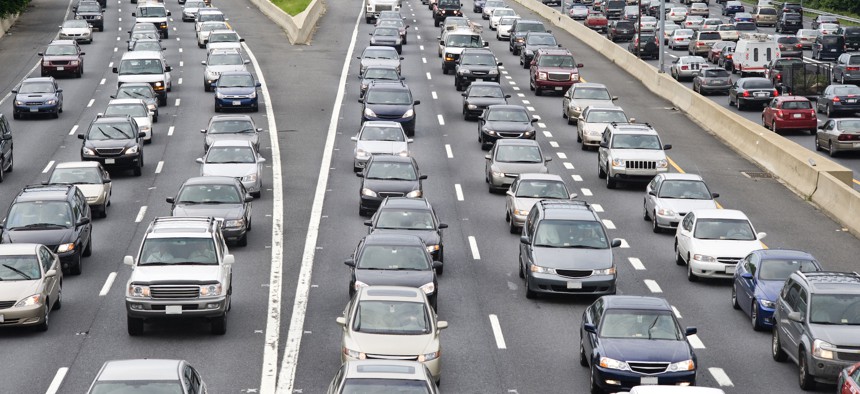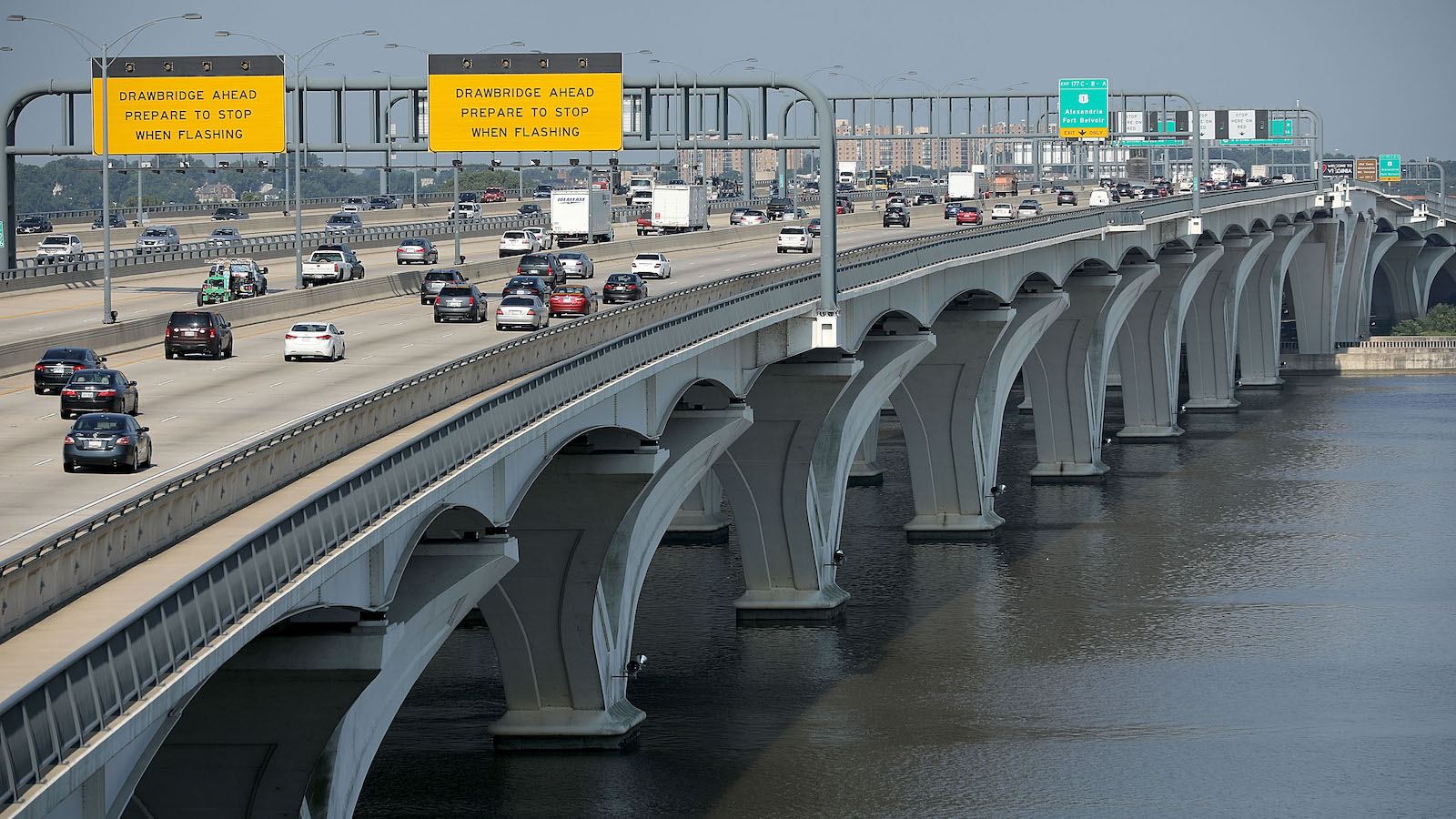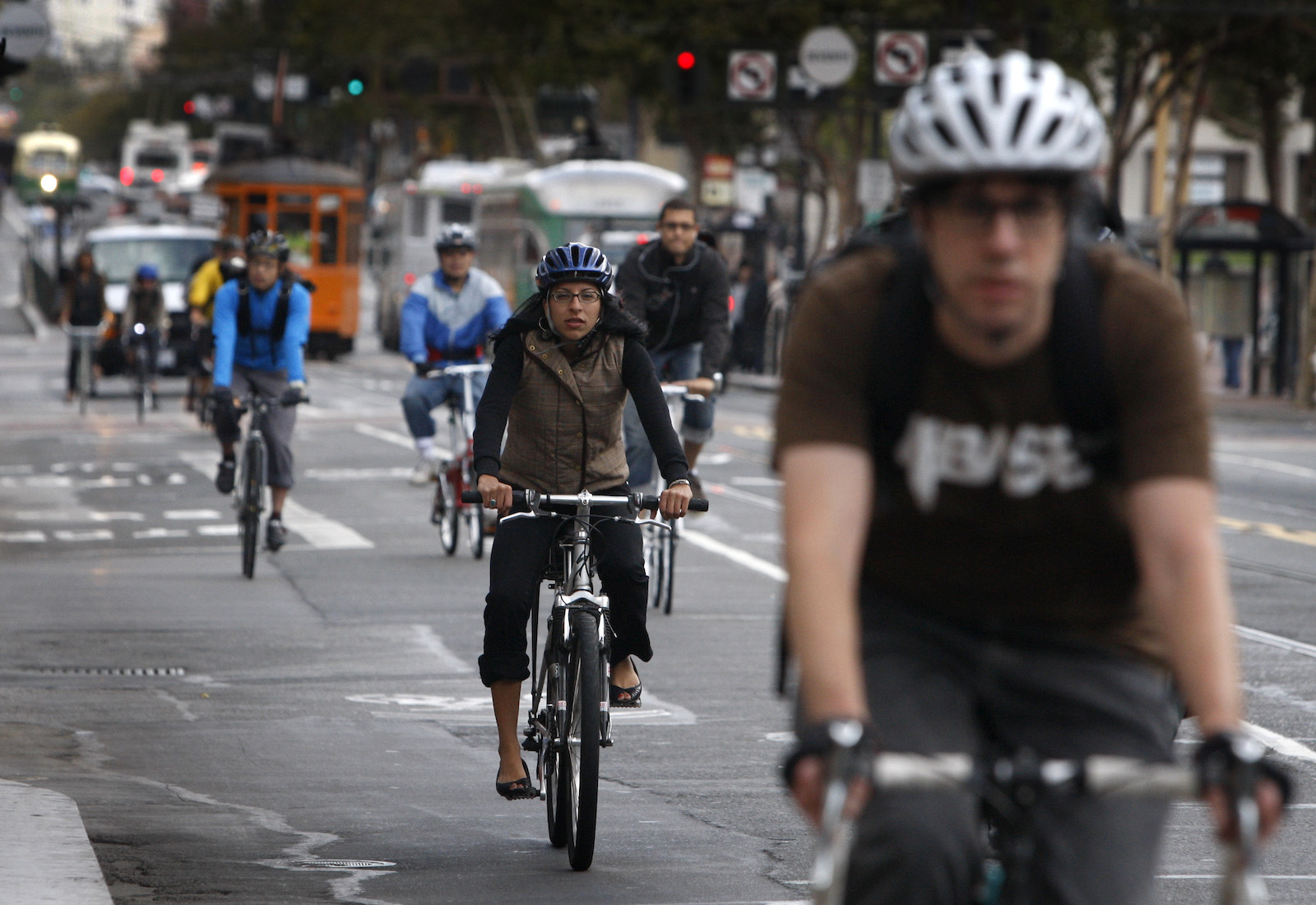Against Federal Guidance, States Plan to Expand Highways

burwellphotography via Getty Images
A new report says money from the infrastructure package could be funneled to “highway boondoggles.”
This story was originally published by Grist. You can subscribe to its weekly newsletter here.
When President Biden signed the $1.2 trillion Bipartisan Infrastructure Package into law last November, many saw it as an opportunity to combat climate change.
The bill could slash emissions from transportation, which is responsible for 27 percent of all U.S. climate pollution. With some $600 billion in new funding for the sector, the Biden administration encouraged state leaders to build out public transit systems and expand “non-motorized” transportation infrastructure, like bike lanes. One analysis from the Georgetown Climate Center estimated that these actions could reduce transportation emissions by 14 million tons per year by 2032 — about as much as the annual emissions from 4.5 million passenger vehicles.
However, some policymakers are flouting that advice.
According to a new report from the nonprofit U.S. Public Interest Research Group, or PIRG, state and local governments are at risk of squandering federal funds to build or expand major highway systems. These “boondoggles,” as the report calls them, would harm local communities and exacerbate climate change, all while failing to solve the traffic and safety problems they claim to address.
“Highway expansion harms our health and the environment, doesn’t solve congestion, and creates a lasting financial burden,” the report says. Although nearly every state has one or more highway expansion projects in the works, the authors highlight seven that would lock in polluting infrastructure and divert a whopping $22 billion away from other transportation needs.
One project is the M-83 expansion, a $1.3 billion project proposed in Montgomery County, Maryland, just northwest of Washington, D.C. According to county officials, the four- to six-lane highway expansion is needed to “relieve projected congestion” and “enhance the efficiency of the roadway network.” Although the project has been paused since November 2017 as city leaders debate its future, it remains part of Montgomery County’s Master Plan of Highways — meaning it could still be built at any time.

Diane Cameron, director of the advocacy group Transit Alternatives to Mid-County Highway Extended Coalition — better known as TAME — said the M-83 expansion is unlikely to alleviate Montgomery County’s traffic problems and should be removed from the Master Plan. “Building and expanding more highways is not the solution to congestion, it actually encourages even more vehicles to be out there,” she said. “The more you build, the more they come — and the more congestion there is in a never-ending cycle.”
That cycle is a well-documented phenomenon known as “induced demand,” in which bigger highways catalyze a series of societal decisions that bring congestion back to pre-expansion levels — or worse. For example, more homes and businesses may crop up along a bigger travel corridor, creating new destinations that are only accessible by car. Bigger highways can influence people to use their vehicles instead of public transit, leave later for work, or move farther away from the city center.
Nationwide, induced demand has already canceled out the congestion benefits of highway expansion over the past few decades. Although the U.S. has added nearly 870,000 lane-miles of highway since 1980, a Texas A&M Transportation Institute report published last year estimated that pre-pandemic congestion on American roadways is worse than it was in the early 1980s.
Expanded highways “might make your commute a little bit shorter for a little while, but eventually that traffic’s probably coming back,” said Matt Casale, PIRG’s director of environment campaigns and one of the report’s lead authors.
Highway expansion can cause a constellation of other problems. In Maryland, Cameron worries that the M-83 expansion would damage local waterways and put schools and homes within a 500-foot “pollution zone” where they’re exposed to increased transportation-related air pollution — which already kills tens of thousands of people every year. Elsewhere, critics argue that a $745 million, 8-mile bypass in southwestern Virginia would damage or destroy nearly 600 acres of forest and farmland. And in Duluth, Minnesota, the $510 million reconstruction of a downtown interchange has been criticized for sapping money away from bus, walking, and biking infrastructure, as well as much-needed repairs for existing roads.

Because highways and other polluting infrastructure are disproportionately cited near low-income communities and communities of color, highway expansion can also pose equity concerns. In Pennsylvania, for instance, a proposed redesign of the Erie Bayfront Parkway — which could cost up to $100 million — has been criticized for potentially exposing Black and brown neighborhoods to more air pollution and separating them from greenways.
“This is a civil rights issue. This is an environmental justice issue,” Gary Horton, president of the Erie NAACP, told a local newspaper.
Instead of doubling down on highway expansion, Casale called for a “fix-it-first policy” that focuses on repairing existing infrastructure. According to a 2021 report card from the nonprofit American Society of Civil Engineers, the U.S. already has a $435 billion backlog of necessary road repairs, with an additional $230 billion needed for bridge repairs and system-wide safety, operational, and environmental improvements.
“To the extent that we are spending on our roads and bridges, we shouldn’t be building new ones,” Casale said. “We should be making sure that the ones we have are safe and up to a state of good repair.”
The report also urges government officials to prioritize investments in public transportation, biking, and pedestrian infrastructure — all of which can effectively address congestion while minimizing damages to public health and the environment. Cameron added that strategically located affordable housing can also be a transportation solution, if built near existing transit stations that give people easy and car-free access to cities’ urban centers.
These measures will take significant public investment, but data suggests they’re broadly popular among the U.S. electorate. According to polling published last month by Data for Progress, three-quarters of all likely voters — across party lines — want the government to spend more money on public transit, and vast majorities think that improved transit would benefit the U.S. and their communities.
To Casale, Biden’s infrastructure package could represent “a turning point” for American transit. “We can take this injection of money and look at it as an opportunity to invest in 21st-century transportation,” he said. “Options that don’t pollute our air, that don’t worsen the climate crisis, and that make our lives better.”
NEXT STORY: Cloud-based 911 for faster emergency response





